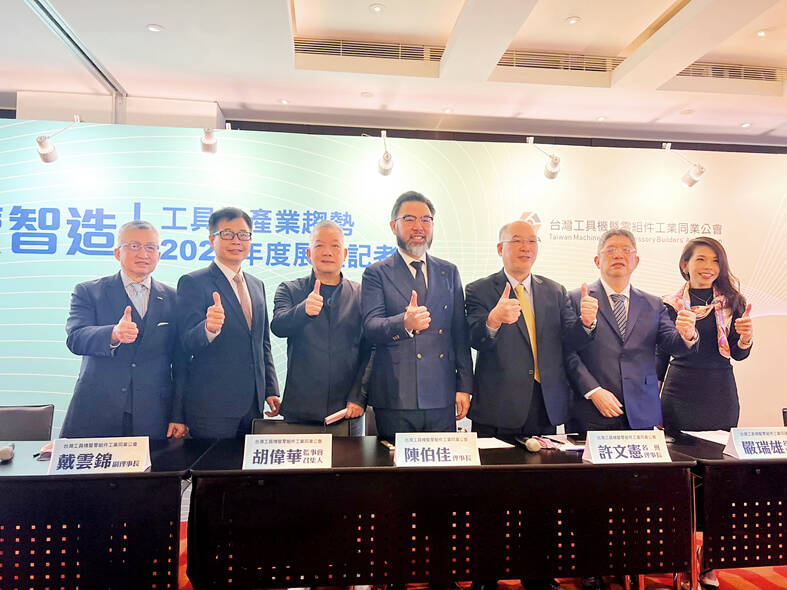Exports by the nation’s machine tool manufacturers are expected to rise a mild 5 to 6 percent annually to US$3.2 billion next year, as a global economic slowdown and geopolitical tensions weigh on machine and equipment spending, the Taiwan Machine Tool and Accessory Builders’ Association said yesterday.
However, Taiwanese companies would still outpace their international peers, as the global machine tools market is expected to contract 3 to 6 percent to about US$79.4 billion, the association said.
Growth in Taiwan’s exports would be driven by resilient demand from suppliers of electric vehicles, 5G devices and green energy applications, it said.

Photo: Lin Jin-hua, Taipei Times
“Although the global economic outlook is not very optimistic, we believe there is still a chance for local machine toolmakers to see growth in exports next year,” association chairman Patrick Chen (陳伯佳) told a news conference in Taipei.
“The industry will recover in the second quarter, benefiting from a revival of the manufacturing sector,” he said.
Chen said that political unrest, global interest rate hikes and soaring energy prices have led to economic slowdowns in the US, the EU and China, which has weakened demand for machine tools in those markets.
Local machine tool suppliers are having a rough ride this year, Chen added.
Customers showed robust demand in the first half of this year as manufacturers resumed capacity expansion after the global economy reopened, Chen said.
However, machine tool makers started feeling the pinch in the third quarter due to China’s “zero COVID-19” policy and prolonged effects of Russia’s invasion of Ukraine, he said.
Businesses are scaling back capacity expansion, or putting on hold new investment plans amid soaring inflation and rising commodity costs, he said.
The association cut its export growth forecast for the nation’s machine toolmakers to 9 percent this year, following a disappointing performance by the sector in the first 11 months, Chen said.
It had previously forecast annual expansion of 20 percent.
During the first 11 months, machine tool exports rose 9.4 percent year-on-year to US$2.76 billion from US$2.52 billion during the same period last year, the association said in a report early this month.
Exports to China, the biggest machine tool export destination for local suppliers, extended an earlier downtrend and dipped 11.8 percent annually to US$721 million from US$817 million, the report said.
China accounted for about 26.1 percent of the nation’s machine tool exports during the first 11 months of this year.
The US came next with a share of 14.8 percent as machine tool exports to the country jumped 37.7 percent year-on-year to US$409 million during the period, from US$297 million a year earlier.
Turkey retained its third spot, with exports totaling US$238 million, up 4.6 percent year-on-year.
Vietnam replaced Russia as the No. 4 destination for local machine tool manufacturers, with exports rising 20.2 percent annually to US$131 million over the period.

RECYCLE: Taiwan would aid manufacturers in refining rare earths from discarded appliances, which would fit the nation’s circular economy goals, minister Kung said Taiwan would work with the US and Japan on a proposed cooperation initiative in response to Beijing’s newly announced rare earth export curbs, Minister of Economic Affairs Kung Ming-hsin (龔明鑫) said yesterday. China last week announced new restrictions requiring companies to obtain export licenses if their products contain more than 0.1 percent of Chinese-origin rare earths by value. US Secretary of the Treasury Scott Bessent on Wednesday responded by saying that Beijing was “unreliable” in its rare earths exports, adding that the US would “neither be commanded, nor controlled” by China, several media outlets reported. Japanese Minister of Finance Katsunobu Kato yesterday also

China Airlines Ltd (CAL, 中華航空) said it expects peak season effects in the fourth quarter to continue to boost demand for passenger flights and cargo services, after reporting its second-highest-ever September sales on Monday. The carrier said it posted NT$15.88 billion (US$517 million) in consolidated sales last month, trailing only September last year’s NT$16.01 billion. Last month, CAL generated NT$8.77 billion from its passenger flights and NT$5.37 billion from cargo services, it said. In the first nine months of this year, the carrier posted NT$154.93 billion in cumulative sales, up 2.62 percent from a year earlier, marking the second-highest level for the January-September

‘DRAMATIC AND POSITIVE’: AI growth would be better than it previously forecast and would stay robust even if the Chinese market became inaccessible for customers, it said Taiwan Semiconductor Manufacturing Co (TSMC, 台積電) yesterday raised its full-year revenue growth outlook after posting record profit for last quarter, despite growing market concern about an artificial intelligence (AI) bubble. The company said it expects revenue to expand about 35 percent year-on-year, driven mainly by faster-than-expected demand for leading-edge chips for AI applications. The world’s biggest contract chipmaker in July projected that revenue this year would expand about 30 percent in US dollar terms. The company also slightly hiked its capital expenditure for this year to US$40 billion to US$42 billion, compared with US$38 billion to US$42 billion it set previously. “AI demand actually

Jensen Huang (黃仁勳), founder and CEO of US-based artificial intelligence chip designer Nvidia Corp and Taiwan Semiconductor Manufacturing Co (TSMC, 台積電) on Friday celebrated the first Nvidia Blackwell wafer produced on US soil. Huang visited TSMC’s advanced wafer fab in the US state of Arizona and joined the Taiwanese chipmaker’s executives to witness the efforts to “build the infrastructure that powers the world’s AI factories, right here in America,” Nvidia said in a statement. At the event, Huang joined Y.L. Wang (王英郎), vice president of operations at TSMC, in signing their names on the Blackwell wafer to